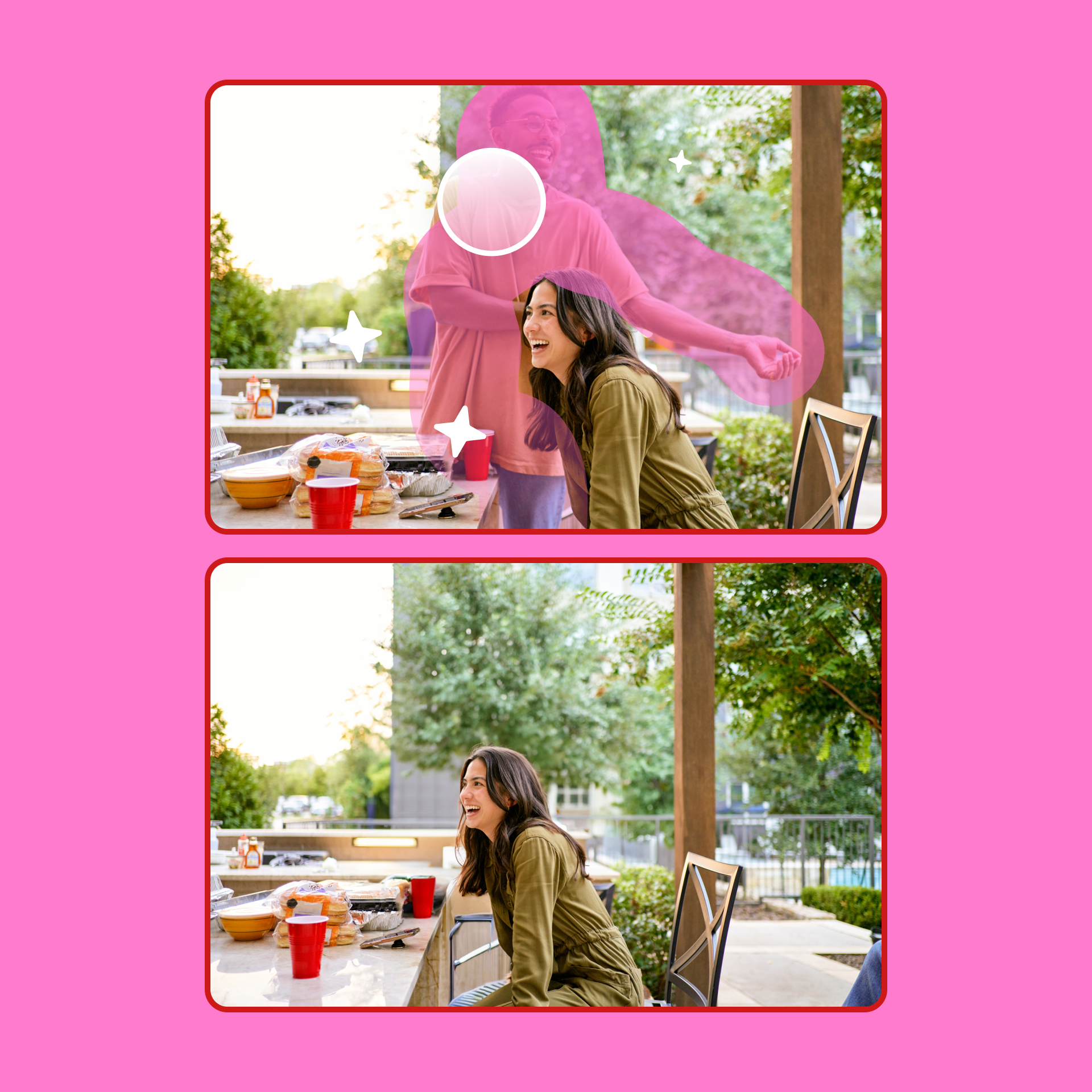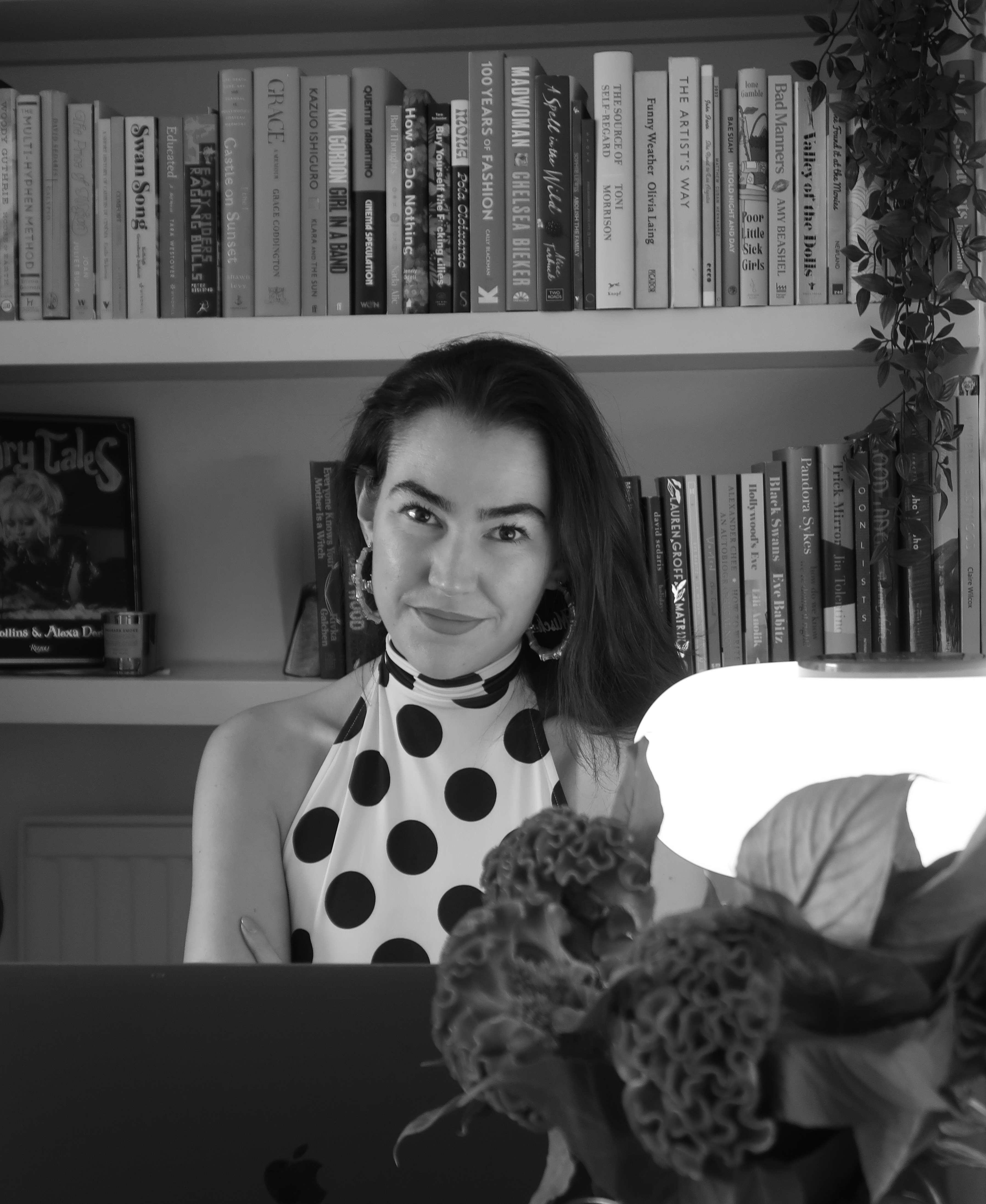Me, Myself, and (A)I - this new tech tool will remove your ex from old photos, but is it healthy?
Here’s why I’d never use an “ex-eraser” tool


Celebrity news, beauty, fashion advice, and fascinating features, delivered straight to your inbox!
You are now subscribed
Your newsletter sign-up was successful
Did I or did I not tell you that this was the era of the Loud Breakup?
We’ve had divorce parties, we’ve had cobwebbing—which, for the uninitiated, is clearing out the debris from past relationships—and now, people, we have a new tech tool solely designed to remove old flames from photos.
Borne from research showing that 62% of single women have at least one cherished photo ruined by a pesky ex, the photo editing software Photoroom and OkCupid have launched the aptly named “Ex-terminator,” which they say is “the world’s first AI-driven ex-eraser tool.” If only it extended beyond the digital world, am I right, girls?
Free, easy, and a little bit savage, depending on whether you’re the terminator or the terminated, the “Ex-terminator” allows you to use a magic brush to “paint” over your ex. Photoroom’s AI technology will then remove the unwanted ex and fill in the background. Essentially, it’s an easier version of Photoshop and an upgrade on the Snipping Tool.

“Whether it’s to heal and move on or to salvage a good photo, millions of folks want to erase their exes from old pictures.” - Lauren Sudworth, Photoroom’s Head of Brand
The aim is to help singles start anew, but I can’t help finding it a bit dystopian. Sure, people have been clipping old lovers out of pictures for decades, but digitally removing people feels oddly more permanent. While physically cutting someone out of a photo (cathartic!) leaves a void that serves as a reminder that the space was once occupied by another person, with editing software, we’re all susceptible to being erased with not so much as a flyaway hair left to show we once stood in the spot next to our former amore.
Don’t get me wrong, I understand the appeal. My boyfriend of eight years still finds it baffling that during his sister’s wedding photos, I purposefully (and kindly, IMHO) positioned myself at the end of the family line-up in case we broke up (in my defence, we’d only been together a year at the time), so they could fold me out of the frame. I am nothing if not a romantic. It’s a canny tactic that my friend Ellen said her grandma uses to hide her husband’s ex-wife. Alice, 27, says her mum paid a colleague to “professionally remove my ex from our graduation photos”.
We already block ex’s phone numbers, archive them from our feeds and mute their stories.
Mischa Anouk Smith
Chartered Psychologist Dr Mark Rackley says that there can be psychological benefits to digitally removing exes from old photos. “If the ex was abusive, cheated or controlling, then editing them out allows you not to have to be triggered or traumatised by old photos of them,” he says. But there are downsides. Dr Mark says that cutting people out can also be used as a way of not dealing with your past and avoiding the reality of negative experiences.
Celebrity news, beauty, fashion advice, and fascinating features, delivered straight to your inbox!
Harriet Inglis, Head of Professional Practice at Relationships Scotland, recommends exploring your reasons for wanting to remove someone. She points out that the experience can’t be deleted, so she asks, what are you hoping to achieve? For Helen, 32, the motivation would only ever be vanity; “I would only ever do that if I just liked the photo of me—nothing else behind it but vanity.”
As is increasingly the case when a new technology launches, Black Mirror got there first. The 2014 Christmas special, White Christmas, introduced a human-blocking technology. In Charlie Brooker’s not-so-dystopian series, blocked characters would appear as blurry blobs with muffled voices. Once blocked, they’d have no means of communicating with the person who blocked them. Ten years since the episode aired, it’s not hard to imagine people employing this technology if it became available. We already block ex’s phone numbers, archive them from our feeds and mute their stories.
Relationship and dating Coach Kate Mansfield says there is always a balance in these situations. A healthy approach is a mix of facing things and allowing yourself time to process why a relationship ended. “Taking personal ownership is the best and fastest way to put a breakup and an ex to rest on your mind and heart,” says Mansfield.
“We know that the majority of people want to erase an ex from an old photo so they can use it on a dating app, and now they can thanks to the Ex-Terminator tool from OkCupid and Photoroom,” Michael Kaye, OkCupid’s Director of Communications tells me. If it wasn’t abundantly clear from the wedding photo fiasco, I am not a hopeless romantic, but this made me feel, well, a bit sad. OkCupid’s study found that 16% of you mercenaries want to use an existing photo on a dating app profile.
Kaye says the tool can help people overcome a breakup, but Inglis is dubious. “I wouldn’t advise it as a tool to achieve closure, as I think to fully process the ending of some relationships is a complex and nuanced exercise.” However, she adds that this all depends on the length and seriousness of the relationship. “A short light-hearted relationship may not need such reflection and therefore digitally removing an ex from an otherwise great picture might be all the catharsis necessary.”

“When we asked our daters, 43% of singles replied that they don’t want to look at their ex in a photo, and 41% said having them erased from photos would actually help them get over the breakup.” - Michael Kaye, OkCupid’s Director of Communications
As someone who takes an inordinate amount of photos (to the ire of everyone around me), I appreciate the frustration of tarnished photos, but if we start wiping out everything that no longer aligns with the most current version of ourselves, do we risk eradicating our histories? Mansfield worries that altering old photos might impact the accuracy of our memories. “Over time, memories naturally change, but editing photos may further contribute to a distorted perception of the past.” She says it’s essential to recognise that relationships—including their ups and downs— are part of personal growth. Social media is enough of a highlight reel as it is; my own Instagram archive has more photos than my main feed, but I draw the line at outright erasing my life. There’s Good, bad, and plenty of ugly, but I’ll never erase an ex.

Mischa Anouk Smith is the News and Features Editor of Marie Claire UK, commissioning and writing in-depth features on culture, politics, and issues that shape women’s lives. Her work blends sharp cultural insight with rigorous reporting, from pop culture and technology to fertility, work, and relationships. Mischa’s investigations have earned awards and led to appearances on BBC Politics Live and Woman’s Hour. For her investigation into rape culture in primary schools, she was shortlisted for an End Violence Against Women award. She previously wrote for Refinery29, Stylist, Dazed, and Far Out.
